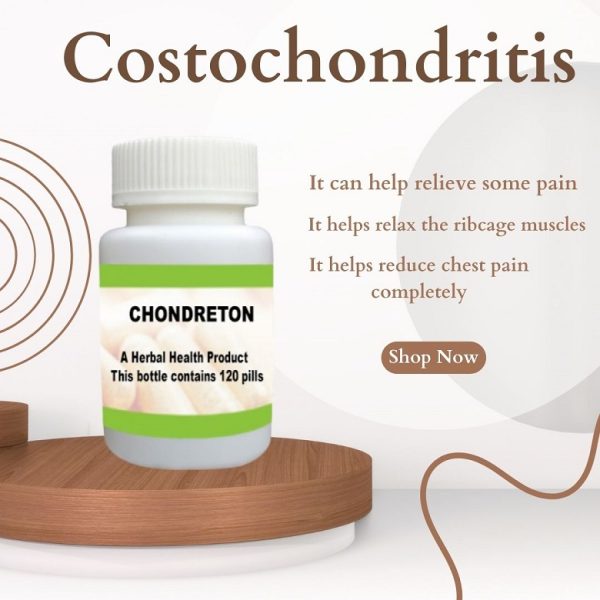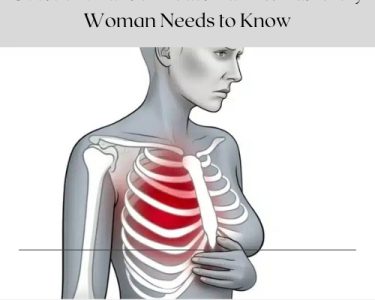Costochondritis is an inflammation of the cartilage that connects your ribs to your breastbone. It can cause severe chest pain that can be difficult to manage. Fortunately, there are several home remedies for Costochondritis that you can use to relieve your symptoms naturally and quickly. These costochondritis natural treatments range from simple lifestyle modifications to herbal remedies and can help reduce pain and swelling in the chest area. Read on to discover the best home remedies for Costochondritis and how to use them for quick and easy relief.
What is Costochondritis?
Costochondritis is a medical condition that refers to the cartilage inflammation that connects the ribs to the sternum (breastbone). It is a common cause of chest pain, especially among adults, and can result from a viral infection, injury, physical strain, or arthritis. Costochondritis is not a life-threatening condition, but it can be extremely painful and uncomfortable for those who suffer from it.
The good news is that Costochondritis can be managed effectively with the help of Natural Treatment and Home Remedies. Many people find relief by making lifestyle changes and incorporating home remedies into their daily routines. You can effectively manage Costochondritis and minimize its discomfort and pain with the right approach. We will explore some of the best Home Remedies for Costochondritis and how they can help you.
Causes of Costochondritis
Costochondritis is often caused by a combination of factors, including injury, infection, or inflammation of the cartilage in the chest wall. Other common causes of this condition include repetitive strain injuries, excessive coughing, and heavy lifting. Costochondritis can also be a symptom of other underlying conditions such as osteoarthritis, rheumatoid arthritis, and fibromyalgia.
While conventional treatments for Costochondritis include anti-inflammatory medication and physical therapy, many people prefer to try natural treatments first. Home Remedies for Costochondritis include rest and ice packs to reduce swelling, hot showers to relax the muscles, and gentle stretching exercises to improve the range of motion. Natural supplements such as omega-3 fatty acids, turmeric, and ginger may also help reduce inflammation and pain associated with Costochondritis.
It is important to consult with a healthcare professional before trying any home remedies or natural treatments for Costochondritis, especially if you have an underlying medical condition or are taking prescription medications.
Symptoms of Costochondritis
Costochondritis is a painful condition that causes inflammation in the cartilage that connects the ribs to the breastbone. Some of the most common symptoms of Costochondritis include chest pain, tenderness, and discomfort that worsens when taking deep breaths or coughing. Pain can be felt on one or both sides of the chest and may radiate to the back or abdomen.
While chest pain can be alarming, it’s important to note that Costochondritis is usually not serious. It can be effectively managed with rest, self-care, and natural treatment options. Some people may find relief from over-the-counter pain medications, such as acetaminophen or ibuprofen.
However, it’s always best to consult your doctor to rule out any other underlying health issues that may be causing your symptoms. Home remedies for Costochondritis may also help alleviate discomfort, such as applying a hot or cold compress to the affected area, doing gentle exercises or stretches, and getting plenty of rest.
If you experience chest pain or discomfort, seeking medical attention is important to ensure proper diagnosis and treatment. In some cases, chest pain may be a sign of a more serious condition, such as a heart attack or pneumonia.
Diagnosis of Costochondritis
You must see a doctor if you experience chest pain, tenderness, and discomfort consistent with Costochondritis. The first step to diagnosis is usually a physical examination. Where your doctor will look for tenderness, swelling, and redness in the affected area.
They may also order imaging tests such as an X-ray, CT scan, or MRI to rule out other potential causes of your chest pain. Additionally, blood tests may be conducted to check for underlying conditions contributing to your symptoms.
It’s important to note that some cases of Costochondritis may not require medical intervention. However, seeking professional care is always recommended if your symptoms are severe or prolonged.
Costochondritis Natural Treatment options, such as Home Remedies for Costochondritis, can help reduce symptoms and promote healing. Still, getting a proper diagnosis and following your doctor’s advice for managing this condition is always important.
Conventional Treatment Options for Costochondritis
There are several conventional treatment options for Costochondritis, which can help to alleviate pain and inflammation. These include nonsteroidal anti-inflammatory drugs (NSAIDs) such as ibuprofen, aspirin, and naproxen, as well as muscle relaxants and pain relievers.
In more severe cases, a doctor may prescribe corticosteroids, which can be injected into the affected area. Physical and hot or cold therapy can also help reduce pain and stiffness.
However, home remedies for Costochondritis may be a better option for those looking for a more natural approach to managing their symptoms. Natural treatments, such as hot compresses, ginger, turmeric, and Epsom salt baths, can relieve pain and help reduce inflammation without the medication’s potential side effects.
It’s important to speak with your doctor before trying new home remedies for Costochondritis, as they can interact with medication or worsen certain medical conditions. However, incorporating natural remedies into your treatment plan can be a safe and effective way to manage your symptoms and promote healing.
Best Home Remedies for Costochondritis
- Heat Therapy – Applying a heating pad or warm compress to the affected area can help ease the pain and discomfort associated with Costochondritis.
- Ice Packs – Ice packs can also effectively reduce pain and swelling in the chest area. Use ice packs for 20 minutes several times a day.
- Turmeric – The anti-inflammatory properties of turmeric make it a popular natural remedy for Costochondritis. Try adding turmeric to your meals, or take it as a supplement.
- Ginger – Ginger is another natural anti-inflammatory that can help reduce the pain and inflammation associated with Costochondritis.
- Magnesium – Magnesium can help relax the muscles and ease pain. Foods high in magnesium include nuts, whole grains, and leafy greens.
- Massage – Gently massaging the chest area can help improve blood flow and reduce pain and tension.
- Rest – Resting and avoiding activities aggravating the condition is important.
Home remedies for Costochondritis can effectively reduce pain and inflammation. But it’s important to consult your healthcare provider before trying new treatments. Remember to listen to your body and avoid activities that cause discomfort.
Lifestyle Changes to Help with Costochondritis
Making certain lifestyle changes can also help with managing the symptoms of Costochondritis. These changes include:
- Proper Posture: Maintaining good posture can help reduce strain on the chest muscles and pain caused by Costochondritis.
Regular, low-impact exercise can help keep the chest muscles and joints strong and flexible. - Healthy Diet: Eating a well-balanced diet rich in anti-inflammatory foods like fruits, vegetables, whole grains, and lean protein can help reduce inflammation and pain.
- Stress Reduction: Stress can exacerbate the symptoms of Costochondritis. Stress-reducing activities like meditation, yoga, or deep breathing can help manage stress and reduce symptoms. It is always recommended to consult with a healthcare professional before making significant changes to one’s lifestyle or treatment plan.




